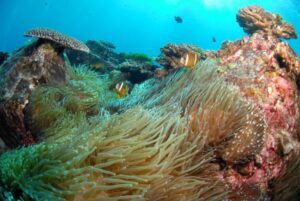Marine heatwave predicted this summer – our scientist explains why we should be concerned
Did you know a marine heatwave has been predicted for coastal NSW this summer?

If you’re not sure what a marine heatwave is, or why it matters then read on.
Across the south-eastern coast of Australia this summer, sea temperatures are predicted to be up to 2.5°C warmer than normal by the Bureau of Meteorology.
Already there is a moderate marine heatwave off the NSW south coast, however, as summer progresses, it is predicted that this may extend across more of the NSW coast.
DPI Fisheries climate change scientist Dr Melinda Coleman spoke about what this meant.
“A marine heatwave is a distinct and prolonged occurrence of unusually warm water in an area. Like heatwaves on land, they can also cause significant impacts in our oceans,” she said.
“Officially, a marine heatwave is declared when marine waters are significantly higher than average for a particular area for at least 5 consecutive days.”
Dr Coleman said a marine heatwave could have serious impacts on our marine life and marine industries.
“We know how the severe marine heatwave in Western Australia in 2011 impacted marine life, and we could expect similar impacts off NSW given we have many of the same species,” she said.
“That marine heatwave led to some major changes to marine life such coral bleaching, the loss of kelp, dieback of seagrass communities and fisheries closures,” she said.
Dr Coleman said species hardest-hit by marine heatwaves are those that cannot move to escape the warmer temperatures.
“All marine species have temperature ranges they can survive within. So, when water gets too warm for extended periods during a marine heatwave, it can impact marine plants and animals, including their growth, health and ability to reproduce and even lead to death.”
“These heatwaves can affect a range of species but those that can’t escape the warmer temperatures because they are fixed in place, such as kelp, corals and seagrass or those that can’t move much (e.g. abalone) are likely to be among the most heavily impacted.”
Marine heatwaves are caused by global climatic patterns affecting sea temperature and ocean currents.
Dr Coleman said the frequency and severity of marine heatwaves is increasing due to climate change.
“Marine heatwaves have always been around, but we are expecting to see them becoming more frequent and more severe due to climate change,” she said.
Dr Coleman is a lead scientist researching the effects of climate change on the NSW coast as part of the Marine Estate Management Strategy Climate change research project.









